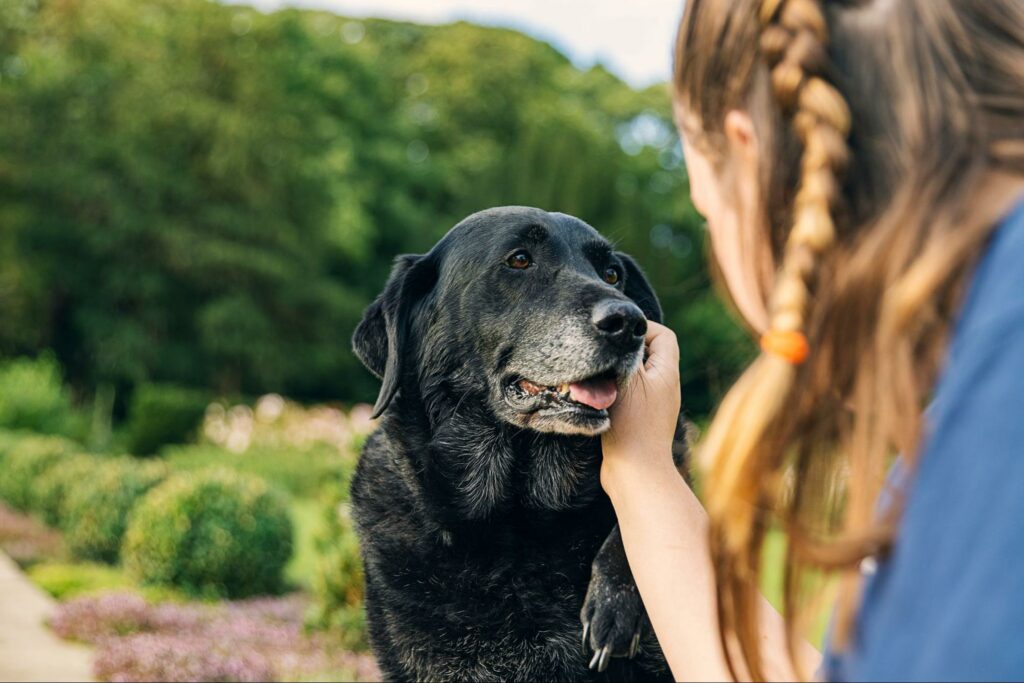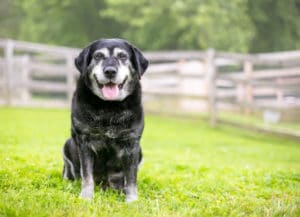Senior dogs are often overlooked at rescues and shelters in favor of the next generation of bouncy, yappy puppies. But if you’re a pack leader to a pup in his golden years, you know that’s a shame because older dogs still have a lot of love to give — and they can still have lots of personality and spunk even if they don’t have as much energy as they did in their younger years.
Senior dogs typically require less exercise, suffer from fewer behavioral issues, and come to you potty trained. They are an excellent choice for those adopting their first dog.
But just because senior dogs are more manageable in many ways doesn’t mean that they don’t also have some special care requirements that younger dogs don’t. Here are a few senior dog care tips for adopting or fostering one of these old-timers if you’re a first-timer.
Rule Out Medical Causes for Behavioral Problems
Senior dogs are less likely to suffer from many issues caused by pent-up energy since they have less to expend. That doesn’t mean they never experience behavioral problems, and the first place to start with behavior issues is at the vet.
Step Up the Vet Visits to Twice a Year
It’s also essential to visit the vet semi-annually since dogs will age faster than humans. Vet appointments include many of the same routine checks for younger dogs, and they may also include additional bloodwork, dental care, and other examinations for symptoms commonly encountered by seniors.
Common Health Problems for Senior Dogs
- Kidney Issues
- Obesity
- Joint Problems/Arthritis
- Cancer
- Hearing and Vision Loss
- Heart Problems
- Incontinence or Gastrointestinal Issues
- Dementia
Stay on Top of Parasite Control
When dogs get older, their immune systems become weaker, which means the potential health risks caused by ticks, fleas, worms, and other pests are greater. Talk to your vet about the safest preventative measures.
Watch Your Pup Eat
Is she having trouble chewing that kibble? Many senior dogs struggle with dental issues and may need to switch to different foods. Another common issue associated with canine aging is problems with digestion. Foods designed specifically for senior dogs often include ingredients that are easier to digest and may even include supplements that help alleviate symptoms associated with aging.
Food Tips for Your Senior Dog
Increase Protein
Senior dogs need more protein to fuel muscle. Older pets can experience a loss in lean body mass, leading them to be unable to walk unassisted or even breathe with some difficulty. Regain your dog’s health by giving them 50% extra food than what is recommended for younger animals
Organ Health
It’s essential to be aware of the nutrients in your dog’s diet. It can help them avoid nutritional deficiencies and obesity, which negatively affect heart health over time! Make sure you know the ingredients by asking for this information when shopping around – not all companies need to disclose these details, but ones that don’t will likely provide them upon request, so ask away.
Consider Supplements
The cost of senior dog foods can be pretty high, with some expensive supplements like glucosamine and chondroitin. The evidence for these products making a difference is limited, but they won’t hurt your furry friend’s health. Omega-3 fatty acids are undoubtedly crucial for aging pups because they may help combat osteoarthritis, especially cognitive losses. If you want to add them to your dog’s diet, combine EPA/DHA (eicosapentaenoic acid) in 700 – 1500 mg. Start low and monitor if there is any diarrhea or vomiting involved. Increase the amount gradually until it reaches an optimal level where no side effects occur while maintaining good health!
Make Food Appealing
When you feed your dog, consider their age and dental health. Senior dogs may have difficulty chewing or suffer from tooth decay and consider other options, such as wet food versus canned/soft foods. If the tooth problems cannot be fixed, consider feeding smaller-sized kibble during meal times; this could help reduce the amount of time spent eating so that less energy goes towards digestion. If your senior dog has trouble getting up or down from sitting on its hind legs, you can serve its meals on a raised platform so they don’t need to bend as far. You could also encourage them to eat while lying down.

Monitor Physical Activity More Closely
Just because he could handle an hour-long walk a year ago doesn’t mean he can today. Regular exercise can help keep your dog mobile longer and prevent him from becoming overweight, which is a common issue for senior dogs, but you also don’t want to push your pup too far. Watch for signs that he’s had enough. Ensuring your dog’s joint health is also critical as the years go by.
Tips for Senior Dog Exercise
Go for Shorter Intervals
Your dog is aging, which means it’ll be putting more strain on its body as time goes by. While a bit of exercise can go a long way to help keep them feeling good through the years, overexerting your faithful friend could cause unnecessary stress or even injury! When exercising older dogs, make sure you stick with short intervals not to wear them out too quickly.
Customized Activities
The older a dog gets, the less active he may become. As you can imagine, this makes life more difficult as we watch our favorite fur baby struggle with age-related issues like lower energy or chronic conditions such as arthritis. To help combat these problems, try changing his usual exercise routine— choose low-impact activities that allow him comfort while still challenging mental stimulation, so the aging neurological system stays sharp.
Stay on a Routine
Senior dogs need short, daily exercise to maintain their health. One or two extensive sessions per week are more harmful than beneficial, so pick a time for your dog’s physical activities and stay consistent!
Don’t Push Too Hard
Some dogs will need less physical activity than others, and it’s crucial not to force exercise if she doesn’t want any more trouble or discomfort during this time in life.
Senior-Proof Your Home
As your dog ages, you may need to adjust to the routine. For example, climbing the stairs can become very difficult, so keep food and water and sleeping areas downstairs if possible.
Also, time outdoors may need to be cut down or only done when monitored since your dog may be more susceptible to changes in temperature and less able to fend off possible threats.
And if your dog suffers from a disability, such as blindness, hearing loss, or an inability to walk, talk to your vet about any special accommodations you should make to ease his experience.
Tips for Making Your Home Safe for Your Senior Dog
- Pick Up Cluttered Floors: Ensure a clear path to the food and water dish, and toys are put away in the same spot.
- Install Ramp: Teach your pup how to use a ramp to get into a vehicle or house.
- Carpets: Invest in carpets or non-slip area rugs to provide a stable surface for walking.
- Bedding: Upgrade your pup’s current bed with more comfortable cushioning.
Embrace Every Day
No one wants to think about their dog passing, but those caring for an older dog know that they have even fewer days to enjoy the companionship. Instead of worrying you or deterring you from adopting a senior dog, use it to live in the moment. Snuggle up. Take a walk together. Appreciate every moment your pup has to give.
What special needs have your senior dogs had, and how did you help them? Let us know in the comments!











